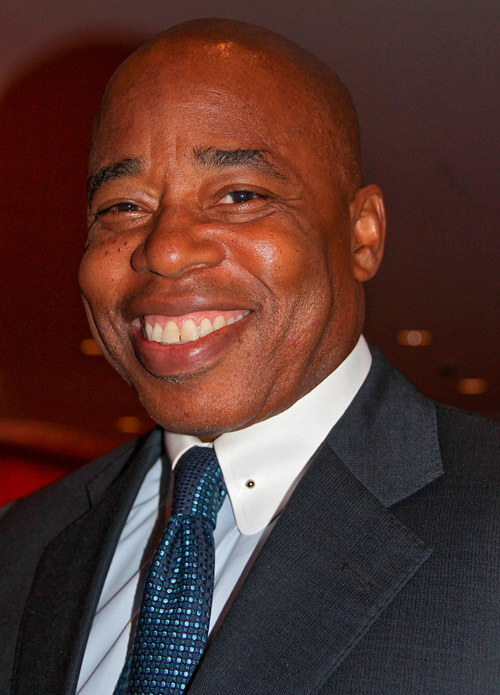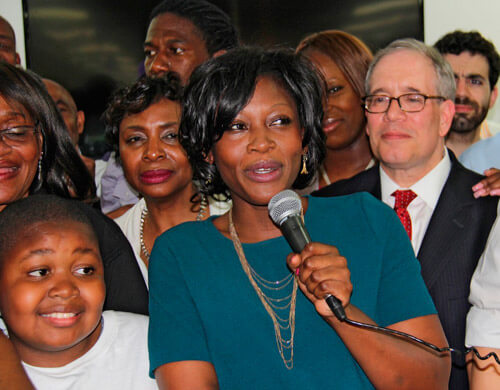The City Council’s Committee on Housing and Buildings last week heard testimony on a package of bills designed to strengthen the city’s tool-kit for preserving the existing housing in which most low- and moderate-income New Yorkers reside.
The preservation-focused hearing comes in the midst of negotiations with the de Blasio Administration on the Mandatory Inclusionary Zoning (MIH) and Zoning for Quality and Affordability (ZQA) proposals.
Council Members, advocacy organizations, city officials, and New Yorkers from across the city highlighted the need to strengthen the City’s preservation efforts, even as discussion about developing new affordable housing through MIH and ZQA continues, according to Brooklyn Councilman Jumaane Williams, chair of the Housing and Buildings Committee, who represents the 45th Council District in Brooklyn.
Williams said most low- and moderate-income New Yorkers live in privately-owned housing.
“Unfortunately, this housing stock is at great risk,” he said. “Some landlords harass and seek to displace low-income tenants in order to replace them with higher rents — either by emptying an entire building for demolition, or more gradually, as a building is turned over unit-by-unit.
“Some landlords fail to provide adequate living conditions, by refusing to make repairs, or by only making short-term, superficial, fixes that leave dangerous underlying conditions in place,” he added. “And in some cases, even where owners have received subsidies to provide affordable housing, they fail to live up to their obligations.”
Williams said that recent investigations by Pro Publica have revealed thousands of units that are required to be affordable have not been preserved for low-income families.
Four proposed bills were discussed at the hearing: Int. 152, sponsored by Council Member Brad Lander, would require building owners seeking to demolish or materially alter a building to obtain a “certificate of no harassment” from NYC Housing and Preservation Department (HPD) in order to make sure that landlords have not used harassment to empty their building of low-income tenants.
Int. 543(Council Member Torres) would empower tenants to bring claims in housing court against landlords for failing to fix a recurring issue caused by an unfixed, underlying condition. The bill would expand a 2013 law that allows HPD to pursue underlying conditions claims against landlords.
Int. 1015(Council Member Kallos) would create an affordable housing internet portal that would identify all of the requirements (and related information) for City-subsidized or supported affordable housing, to help make sure we have all of the necessary information to make sure the rules are being followed.
Int. 1044(Public Advocate James) would require Department of Buildings (DOB) to deny a permit when a building has a significant number of immediately hazardous violations (2 or 3 per unit, depending on the size of the building). The local law excludes permits sought to correct DOB or HPD violations.
“Our City is in the midst of an affordability crisis, and too often seniors and working families are forced to endure harassment and live in deplorable conditions simply because some landlords view affordability as an excuse to neglect their responsibilities, or worse, an invitation to force their tenants out,” Williams said. “One thing is clear: we cannot build our way out of the housing crisis. I’m proud of the Housing Committee’s work to preserve existing affordable housing and ensure all New Yorkers can afford safe, stable housing free from harassment.”
“Tenants in neighborhoods throughout the City are facing increasing pressure from landlords who want to profit off of harassment. The city needs more proactive tools to prevent the displacement of low-income tenants and preserve our existing affordable housing stock,” Benjamin Dulchin, Association for Neighborhood and Housing Development (ANHD). “Putting a smart, citywide Certificate of No Harassment Program in place would go a long way towards discouraging harassment and keeping tenants in their homes and communities.”
“New York City is losing affordable housing at an alarming rate and landlords’ harassment tactics are ever evolving. The City Council needs to respond swiftly and strongly to combat displacement,” said Harvey Epstein, of the Urban Justice Center. “Passing the four bills being heard today and the 12 bills in the Stand for Tenant Safety legislative package creates a diverse set of tools that tenants can use to fight harassment and stay in their own homes.”

























